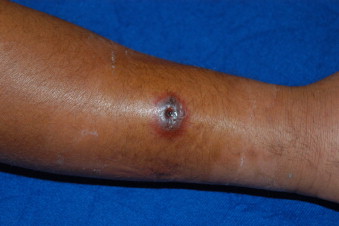Sierra Leone’s health authorities have confirmed the first cases of human infections of anthrax, less than a week after an outbreak of the disease in animals was reported.
The Ministry of Health says three people tested positive for the bacterial infection which was first confirmed in animals at the beginning of last week in the northern Port Loko district.
A spokesman in the Ministry of Health said the human cases were detected in neighboring Karene District.
Harold Thomas, Communications Lead in the Directorate of Health Security and Emergencies in the Ministry of Health and Sanitation (MoHS) told ManoReporters that samples from four people who presented with symptoms of the disease were tested and three came back positive for anthrax.
In Port Loko, over 200 animals have been confirmed dead due to the outbreak. Officials in the ministries of Agriculture and Health said they mounted investigation in response to reports of several unexplained deaths of animals in Tinkabere Village in Kamasondo, Bakeloko Chiefdom. A total of 223 livestock – 91 heads of cattle, 53 goats and 79 sheep – were eventually confirmed dead.
According to Thomas, there has been no indication of human-to-human transmission, which means that those who were infected in Karene might have got it from either infected animals, animal products or the bacteria spores.
Anthrax is described as a serious infectious disease caused by a bacteria known as Bacillus anthracis. The bacteria occurs naturally in soil and commonly affects domestic and wild animals. Human beings can get sick with it too if they come in contact with infected animals or contaminated animal products. But the disease is treatable.
According to the Health ministry spokesman, all the confirmed human cases were Cutaneous anthrax, which is the most common of the three types of the disease and the less dangerous one.
The other two types are Inhalation and Gastrointestinal anthrax.
“Cutaneous anthrax is less severe and it is treatable with antibiotic,” says Thomas, who is also the Manager of the Health Education Programme at the MoHS. He however warned that the public must be vigilant about the consumption of meat, especially those of ruminant animals.
“People should buy meat at places where all procedures are followed,” he said.
Thomas also said that while they are monitoring the entire country, the focus is on the northern districts.
The Health Ministry categorizes anthrax as a reemerging zoonotic disease. The last outbreak of the disease in the country was reported in 1994.
Anthrax exists in the form of spores, which experts say can survive for decades in the soil, until they are contracted by the right host, usually animals, which either ingest them while grazing or inhale them through dust infested with the spores.
Ruminant animals infected by anthrax are often found dead with no indication that they had been ill.
Humans become infected through eating meat of infected animals or handling of products of infected animals. People can also get infected by it by inhaling airborne anthrax spores.
According to the ministry of agriculture, the outbreak has affected six cattle ranches, known locally as Worrehs.
At a press briefing last Monday, agriculture minister Abu Bakarr Karim said all Worrehs in the affected area had been ordered to institute quarantine restrictions, alongside sheep and goat farms, until the outbreak is put under control.
Movement of livestock and their products from the affected areas was also declared prohibited, he said.
Officials also urged members of the public not to try to administer treatment on any sick animal on their own and to report all such cases.
Scientists at Njala University were involved in the investigation of the outbreak.
The university said in a statement that it intends to lead a study to trace the epidemiological origin of the disease.
Prof. Roland Suluku, the head of the Animal Science Department and the Molecular Diagnostic Laboratory at Njala, will be leading the study.
Suluku was quoted by Politico Newspaper warning that since Port Loko is close to Freetown, there’s the possibility that the anthrax disease could have penetrated the Freetown market.
Dr Mohamed Vandi, Director of Health Security and Emergencies, told AYV TV that the best move at this point is for people to avoid consuming meat.






















